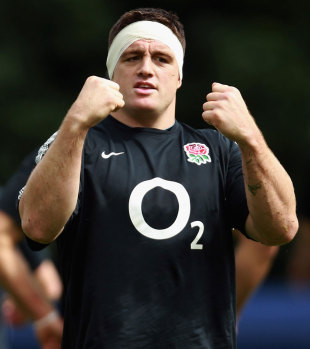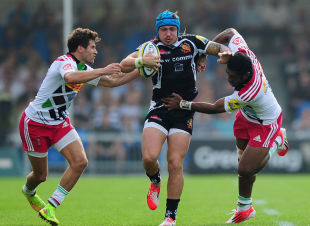|
Player welfare
It's time to look after our most prized assets
Tom May
November 18, 2014

England's players are on a relentless schedule ahead of the World Cup © Getty Images
Enlarge
Without a shadow of a doubt, in the 17 years since I started training with Richmond in a professional environment in 1997-98, rugby has become a massive battle of attrition. So much has changed within the game and now players are struggling to keep up with the demands placed on them physically. The methods used to train professional athletes now mean that size and strength is of huge importance. I was at this season's RPA Academy Induction Day in Loughborough in August and I have never seen so many massive lads wandering around in one place - some, if not the majority, were young enough to be my son - but it was me looking like the little boy. It made me think back to the days when I was in a similar position - no one was ever that big, not even Andrew Sheridan. How are they going to survive long careers smashing into each other at an ever increasing pace and ever increasing regularity? Seventeen and 18-year-olds are weighing close to, if not more than, 100kg and they haven't even stopped growing. It's frightening. 
Not even Andrew Sheridan was as big as the Academy boys are now
© Getty Images
Enlarge
The focus on strength and conditioning is huge and it means one thing: players will continue to find ways to make little improvements that add to their strength, power and speed. We only really think of the games at the weekend taking a toll on a player's body but training is just as tough week-on-week. In some clubs, players given the weekend off from playing take part in the whole week building up to the game - effectively they are only 80 minutes short of the lads that play. The physicality and intensity during training is high; it has an effect on you. It's not "just a training session". Over a five-day period players will have done three or four weights sessions, five - maybe six - rugby sessions and that's not even taking into account the game at the weekend. Add to that the mental strain of being involved in professional sport and you have an issue that needs to be looked at. Of course it is the best job in the world but it's tough. Mental strain and fatigue is just as prominent in sport as the physical strain. Then there's the matches, which are a concern. Top clubs playing big blocks of games in the Premiership and the new European Champions Cup don't get the opportunity to rest their best players as they need to be at the forefront of these competitions. Players don't want a rest either even though it might be the best thing for them. Every player wants to play every week, you don't want to miss out, and you don't want others to play in your position. Rest is a massive aspect of life within professional sport but it is sometimes used too sparingly. It gets even worse for the international lads. The ones that need to be feeling in the best physical shape have the most demands placed on them through the year. Clubs need to use their most prized assets but they need to care for them, too. Last summer the England side went down to New Zealand, arguably the toughest place to go on tour. Having had only three weeks break after that the players were back working incredibly hard in pre-season. It takes about two weeks to wind down from the season before you can start relaxing. The off-season is becoming increasingly non-existent for the top players - the ones we need to be flying by World Cup time next September. Let's hope they get an opportunity to rest up at some point. Ironically, the Top 14 in France (which doesn't come close to being as professional as the leagues in the UK) gives the players much more rest than their British opposition. I doubt very much this is because they are thinking of how it would be nice to rest Player X this weekend so he can recover. It's more a case of the clubs having such big budgets that they have enough other players to fill the void and keep team performance consistent. The players with the biggest pay packets are the ones getting the most rest but then I guess you would expect that as the clubs can look after their own targets without compromising player health. If they didn't have the opportunity to provide rest, I very much doubt they would. 
Exeter have their eyes on Jack Nowell's dodgy knees
© Getty Images
Enlarge
I've also been reading articles on the new artificial pitches over the past couple of weeks. Saracens, Newcastle and Cardiff have made the choice to have this as their main pitch but the jury is still out as to the cumulative effect on the body. Exeter made the choice to rest Jack Nowell at Newcastle after he returned from a big knee injury because they didn't want to lose one of their most important assets again, which is understandable. We used to train on an artificial pitch every day at Newcastle when I was there. It was amazing not having to clean muddy kit every day but I think there are a few lads who paid the price with a few creaking backs, knees and calves for years after. The entertainment provided by the matches supporters watch week in, week out becomes a focus in the rank rain and wind. These three clubs have done their best to try to make sure that the conditions underfoot don't affect the product on show. I'm not convinced they are going to be the answer - knee problems are arguably more common on these surfaces and player loss may outweigh the club product's gain. Player welfare is something constantly being looked at. Concussion studies have been carried out and we have heard all about them very recently. Players are being asked to take educational training on it and the player representatives constantly try to do their best to make sure that professional players are looked after as best they can. But it's hard. The balance has to be found between what is best for the players and what is best for the clubs. I think there is only ever going to be one winner here with clubs coming out on top. They pay the wages and employ the players so why shouldn't they have the final say - a valid argument. I hope something is done to look after players more as it is getting to a point now where the game demands so much of those playing it that they face a higher risk of injury now than they did before. © ESPN Sports Media Ltd
|
Live Sports
Communication error please reload the page.
-
Football
-
Cricket
-
Rugby
-
- Days
- Hrs
- Mins
- Secs
F1 - Abu Dhabi GP
Abu Dhabi Grand Prix December 11-131. Max Verstappen ()
2. Valtteri Bottas (Mercedes)
3. Lewis Hamilton (Mercedes)
4. Alexander Albon ()
5. Lando Norris ()
6. Carlos Sainz Jr ()
-
ESPNOtherLive >>
Snooker - China Open
Tennis - Miami Open

